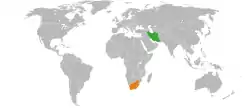Iran–South Africa relations
Iran–South Africa relations refers to the historical and current bilateral relationship of the Islamic Republic of Iran and South Africa. Both economically and politically, relations between the two countries are quite warm and have continued to expand.
 | |
Iran |
South Africa |
|---|---|
South Africa and Iran share historical bilateral relations and the latter supported the South African liberation movements. It severed official relations with South Africa in 1979 and imposed a trade boycott in protest against the country's apartheid policies. However, in January 1994, Iran lifted all trade and economic sanctions against South Africa and diplomatic relations were reestablished on 10 May 1994.[1]
 | |
| Imperial State of Iran | South Africa |
|---|---|
Economic relations
South Africa and Iran share good trade relations, with South African exports increasing by 7 percent from $1.4 billion in 2006 to $1.5 billion in 2007, and imports from Iran, mostly crude oil, increasing by 13.5 percent from $18.3 billion in 2006 to $20.8 billion in 2007.[2] Iran was the largest supplier of crude oil to South Africa in 2007.[3]
Several South African companies are involved in major projects in Iran. MTN Group has a 49-percent stake in the Irancell consortium which was awarded the second mobile telecommunications license in Iran. It started operations in October 2006.
Sasol is participating in a $900-million polymer joint venture with the Iranian state-owned petrochemicals company, Pars Petrochemicals Company, which produces ethylene as well as high- and low-density polyethylene. The joint venture is known as the Arya Sasol Polymer Company. Iran and South Africa have equally invested 1.35 billion euros in the project. Arya Sasol Petrochemical Complex is among the world's biggest polymer projects. When the complex comes on stream, 400,000 tons of ethylene, 90,000 tons of C3 cut, 300,000 tons of medium and heavy polyethylene, and 300,000 tons of light polyethylene will be added to Iran's petrochemical output. Construction operations of the complex started in Pars Special Economic Energy Zone in 2002 and the project has made over 97-percent progress by May 2009.[4]
In the 12th meeting of the South Africa–Iran joint commission held in Tehran, Iran 10–11 May the South African Minister of International Relations and Cooperation condemned the imposition of Sanctions against Iran, saying the sanctions are "irrational and illegal". The minister showed interest to improve the trade relations in areas such as education, health, investments, mining, transport, agriculture, science and technology, and energy once the sanctions are lifted.[5]
Relations during apartheid
Ties between the Iranian government under the Pahlavi dynasty and South Africa's predominantly white government were close during apartheid. After Reza Shah abdicated in 1941, he exiled himself to South Africa then he died there in 1944. His son, Mohammad Reza Pahlavi visited the country during the 1970s where he was received by B J Vorster.
During the Iran–Iraq War, South Africa is believed to have sold defence technology to Iran in exchange for oil.[6]
References
- "Archived copy". Archived from the original on 13 August 2009. Retrieved 6 February 2016.CS1 maint: archived copy as title (link)
- "Archived copy". Archived from the original on 13 August 2009. Retrieved 6 February 2016.CS1 maint: archived copy as title (link)
- "Archived copy". Archived from the original on 13 August 2009. Retrieved 6 February 2016.CS1 maint: archived copy as title (link)
- "Archived copy". Archived from the original on 9 May 2009. Retrieved 9 May 2009.CS1 maint: archived copy as title (link)
- http://allafrica.com/stories/201505120905.html
- R. T. Naylor (2008). Patriots and Profiteers: Economic Warfare, Embargo Busting, and State-Sponsored Crime. McGill-Queen's Press - MQUP. p. 208. ISBN 978-0-7735-7489-2.
